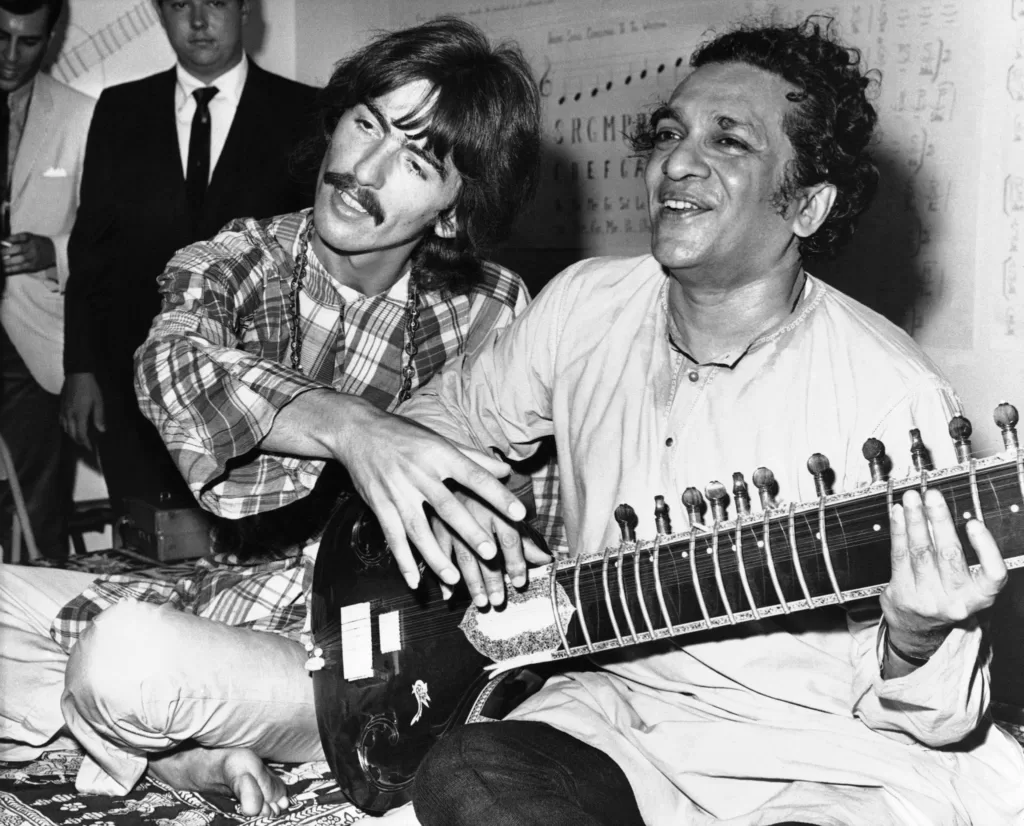Introduction
Pandit Ravi Shankar, a legendary sitar virtuoso who passed away, was not only a maestro of classical Indian music but also a trailblazer who catalyzed the fusion of diverse musical traditions. His groundbreaking collaborations with Western rock, jazz, and pop musicians left an indelible mark on the global music landscape, making Indian music accessible to a broader audience. In this blog, we’ll delve into Pandit Ravi Shankar’s remarkable contributions and his pivotal role in bridging musical worlds.

Pandit Ravi Shankar’s Fusion Journey:
In the tumultuous 1960s, marked by protest and revolution, Pandit Ravi Shankar’s music emerged as a beacon of cultural exchange. George Harrison of the Beatles, a cultural icon of the era, introduced the sitar to Western audiences in their 1965 hit “Norwegian Wood.” Soon after, the Rolling Stones incorporated the sitar into “Paint it Black” in 1966. However, it was Panditji’s performance at Woodstock in 1969 that truly embedded Indian music in Western popular consciousness, earning him the title of ‘Billboard Musician of the Year.’
What set Pandit Ravi Shankar apart was his ability to play with the skill of a traditionalist while making his music accessible and enjoyable to newcomers to Indian classical music. His versatility even extended to composing music for Indian films. Memorable compositions like “Sanware Sanware” in Raag Bhairavi from the 1960s film “Anuradha” and the title track from Satyajit Ray’s “Apur Sansar” showcased his cinematic prowess.
A Traditional Foundation with a Global Vision:
Pandit Ravi Shankar’s musical journey began under the rigorous tutelage of Ustad Allauddin Khan, the founder of the ‘Senia Maihar Gharana.’ His training was deeply rooted in tradition, including demanding physical discipline. However, Ravi Shankar’s unique ability lay in breaking free from traditional dogmas to connect with new audiences worldwide.
His Legacy: Paving the Way for Shakti and Beyond:
Pandit Ravi Shankar’s influence extended beyond his own performances. He imparted his knowledge of Indian classical music to John McLaughlin, a pioneer who founded the Mahavishnu Orchestra and later played a pivotal role in creating Shakti. With Shakti, fusion music found a path firmly grounded in the future, blending Western, Hindustani, and Carnatic traditions.

Conclusion
While India boasts several great sitar exponents, Pandit Ravi Shankar stands out as the ultimate bridge between diverse musical traditions. His story teaches us that traditions should evolve and adapt to reach new audiences, keeping them alive and relevant. Pandit Ravi Shankar’s legacy continues to inspire musicians and music lovers worldwide, reminding us of the boundless possibilities when cultures harmoniously converge.
In memory of Pandit Ravi Shankar, we say, “Go with God, Panditji!” His music will forever resonate across generations and borders, a testament to the enduring power of artistic fusion and cultural exchange.










